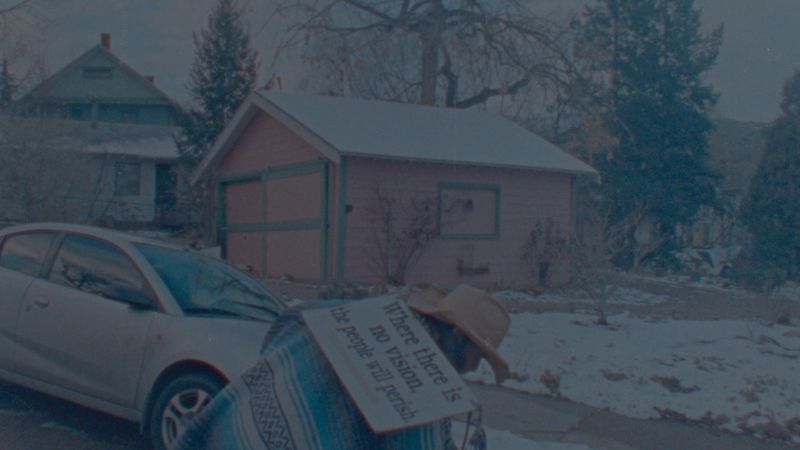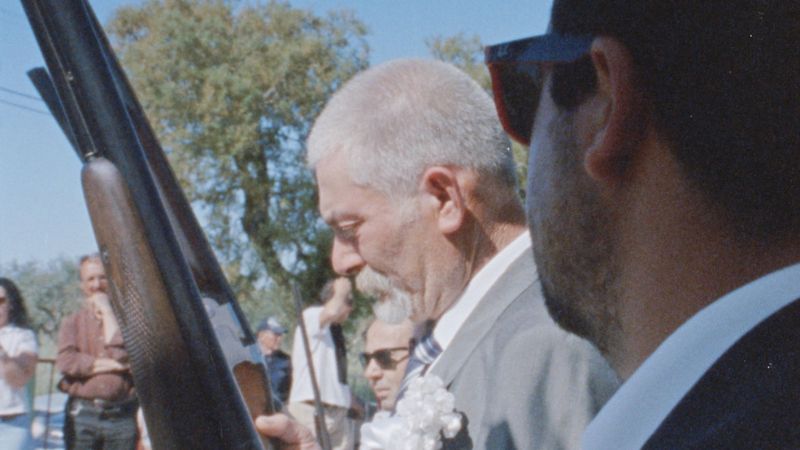In this fascinating and unique hybrid of a biographical documentary and a film essay, Ricardo Leite does not respond directly, but he also leaves no doubt: the vision is necessary. Also, it can never be only personal because the individual experience is deeply embedded in common history. «Human reality is a collective construction,» claims Leite in the first person narration, «without the other, reality ceases to exist.» Indeed. His film is, in the first place, a precious look into the hidden, dark, messy, and in no way glorious history of post-WW2 Europe, from its totalitarian regimes and colonial wars to the recent austerity measures and refugee crisis.

Film alchemy
Visually, Lucefece is composed of archival material and super 8 and 16mm film recordings Leite himself filmed and hand-processed for over 20 years. At the very core is his interest in material conditions of the film medium, «cinema alchemy»: from his first experiments with film to the collection of the remains of the analog film industry in his travels all over Europe, to his obsession with non-toxic developing chemistry that led him to process film images with coffee, vitamin C and vinegar. This fascination is deeply intertwined with memories of his father. The flickering images of a house in which he started filming at the same time show where he lived while visiting his father in jail. And his memories of his father are also tied to his father’s memories.
At the very core is his interest in material conditions of the film medium, «cinema alchemy»
The War
The opposite of the vision, the dark side of the dreams of space travel, is thus revealed: the war. The film covers a period from the independence movements in Portuguese colonies, Angola, Mozambique, and Guinea in Africa that led to the Portuguese Colonial War from 1961 to 1974 to the European migrant crisis of 2015 when Mohamed, a refugee Leite encountered in Budapest, remarked, «I am for peace, but I feel the third world war is close.»
To avoid taking part in the colonial war, Leite’s father, a communist and opponent of colonialism, war and arms, tried to escape to France. Shortly after his failed attempt, he was drafted and sent to war. «Most people have no idea what it’s like. It’s no joke. It scars you. In Africa, in the jungle, after 27 months…we were all a bit insane already…» he recalls, years later.

The Art
The moment in the film when the personal and political most clearly intersect is the episode from the archives of the Portuguese national broadcaster RTP. It’s a program following the screening of a film, in which a group gathered in a TV studio is invited to discuss the film they just saw. The episode reveals the hierarchies (the first to speak is a commander) and values (the need to acknowledge the tastes of ordinary people) of the time. But this is also a meta-discursive moment, addressing the question of the meaning of art and its role within society. While the commander complains that the film they saw was not comprehensible, the artist demands respect for the freedom of expression and rejects the question about what is reflected in art. Since art is itself a kind of reality, one can only ask, what is it changing? The conclusion is supplied by the director himself, «The artist is a conspirator who destroys stigmas.»
Since art is itself a kind of reality, one can only ask, what is it changing?
You can’t catch the poet
The short interview with the late Portuguese poet and journalist Sebastião Alba confirms Leite’s claims. Alba lived in Mozambique for a long time, was a member of the Mozambique Liberation Front, and was imprisoned for years because he refused to join the army and participate in the colonial war. After he returned to Portugal, says Leite, Alba started heavy drinking and living on the streets, yet he never stopped writing until one night he was run over by a hit-and-run driver.
The hand-developed celluloid shots give tone to the complete film. With changing speed and illumination, they create a proper rhythm of uneven exchange of dark and light. These flickering images present a contrast to the dark fragments of European history and the intimate history of a Portuguese political prisoner’s son. But this same flickering also makes visible the light as the material condition of vision, the declared theme of this film.
It visibly confirms the power of vision. It reminds contemporary audiences of the enchanting dance of rays of light that fascinated the early film pioneers. It matches well the laughs and words of Alba, who, chatting with his interviewer, repeats more times, «You can’t catch the poet.»
It illuminates both humanity’s need for people with vision and the sad fact that throughout contemporary European history, people with vision have been persecuted to this day. There is no happy ending for this opposite in the narrative of Lucefece, but there is also no doubt that we are on the side of the visionaries.



